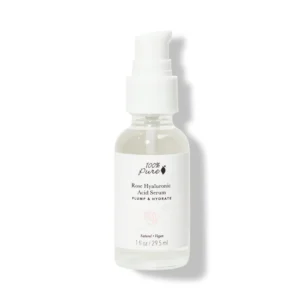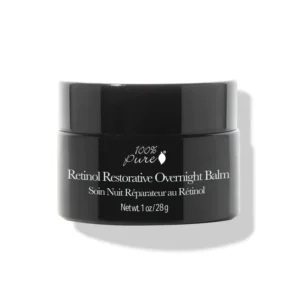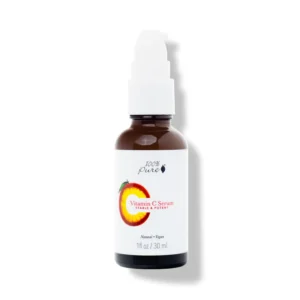Ingredients to Embrace and Avoid

As we gracefully age, our skincare needs evolve, requiring targeted ingredients and formulations to address common signs of aging such as fine lines, wrinkles, and loss of elasticity. While there’s no shortage of anti-aging products on the market, many contain harsh chemicals and irritants that can exacerbate skin sensitivity and accelerate the aging process. Clean skincare offers a gentler, more holistic approach to aging gracefully, harnessing the power of natural ingredients to nourish, rejuvenate, and revitalize mature skin. In this blog, we’ll explore three key ingredients to embrace and avoid in clean skincare for aging skin, empowering you to achieve radiant, youthful-looking skin at any age.
Embracing Youthful Radiance
- Hyaluronic Acid
Hyaluronic acid is a powerhouse ingredient beloved for its ability to deeply hydrate and plump the skin, diminishing the appearance of fine lines and wrinkles. As we age, our skin’s natural hyaluronic acid levels decline, leading to dehydration and loss of elasticity. Incorporating hyaluronic acid into your clean skincare routine can help replenish moisture levels, smooth texture, and restore a youthful glow.

Look for clean skincare products formulated with pure, plant-derived hyaluronic acid, free from synthetic fillers and additives. Hyaluronic acid serums and moisturizers are particularly effective for aging skin, delivering lightweight hydration without clogging pores or feeling heavy on the skin. Additionally, hyaluronic acid pairs well with other anti-aging ingredients like vitamins C and E, enhancing its brightening and antioxidant properties for optimal results.
- Retinol (Vitamin A)
Retinol, a form of vitamin A, is renowned for its ability to stimulate collagen production, accelerate cell turnover, and fade hyperpigmentation, making it a powerhouse ingredient for addressing multiple signs of aging. While traditional retinol formulations can be harsh and drying, clean skincare brands offer gentler alternatives derived from natural sources like rosehip seed oil and bakuchiol.
Retinol Restorative Overnight Balm

Clean retinol serums and creams provide all the benefits of traditional retinol without the potential side effects, such as redness, irritation, and sensitivity to sunlight. These formulations work gradually to improve skin texture, minimize wrinkles, and promote a more youthful complexion, making them suitable for even the most sensitive skin types. When incorporating retinol into your clean skincare routine, start with a lower concentration and gradually increase frequency to minimize the risk of irritation.
- Antioxidants
Antioxidants play a crucial role in defending the skin against environmental damage, oxidative stress, and premature aging caused by free radicals. Common antioxidants found in clean skincare include vitamin C, vitamin E, green tea extract, and resveratrol, each offering unique benefits for aging skin.

Vitamin C, in particular, is prized for its brightening and collagen-boosting properties, helping to fade dark spots, even out skin tone, and improve overall radiance. Look for clean skincare products formulated with stable, potent forms of vitamin C, such as ascorbic acid or sodium ascorbate, to ensure maximum efficacy. Additionally, antioxidants like vitamin E and green tea extract provide soothing and anti-inflammatory benefits, making them ideal for calming redness and irritation often associated with aging skin.
Ingredients to Avoid
While embracing beneficial ingredients is essential for addressing aging skin concerns, it’s equally important to avoid harsh chemicals and irritants that can exacerbate sensitivity and inflammation. Here are three ingredients commonly found in skincare products that may be best avoided in clean skincare for aging skin:
- Parabens
Parabens are synthetic preservatives commonly used in skincare and cosmetic products to prolong shelf life and prevent bacterial growth. However, research has raised concerns about the potential health risks associated with parabens, including disruption of hormone function and increased risk of breast cancer. To maintain clean skincare standards, opt for paraben-free formulations that rely on natural preservatives like plant extracts and essential oils.
- Sulfates
Sulfates, such as sodium lauryl sulfate (SLS) and sodium laureth sulfate (SLES), are surfactants often added to cleansers and foaming products to create lather and remove dirt and oil from the skin. While sulfates are effective at cleansing, they can also strip the skin of its natural oils, leading to dryness, irritation, and compromised barrier function. Clean skincare alternatives utilize gentle, sulfate-free surfactants derived from coconut or sugar to cleanse the skin without causing damage or disruption.
- Synthetic Fragrances
Synthetic fragrances are commonly added to skincare and cosmetic products to impart a pleasant scent and enhance the sensory experience. However, many synthetic fragrances contain phthalates and other potentially harmful chemicals that can trigger allergic reactions, skin irritation, and respiratory issues. Clean skincare brands prioritize natural fragrances derived from essential oils, botanical extracts, and fruit essences, offering a safer and more skin-friendly alternative for aging skin.
Incorporating clean skincare into your anti-aging routine is a simple yet powerful way to nourish and rejuvenate mature skin while minimizing the risk of irritation and adverse effects. By embracing key ingredients like hyaluronic acid, retinol, and antioxidants, and avoiding harsh chemicals and irritants, you can achieve radiant, youthful-looking skin that glows with health and vitality. Remember to prioritize products that are formulated with high-quality, natural ingredients and free from potentially harmful additives, empowering you to age gracefully and confidently at every stage of life.




